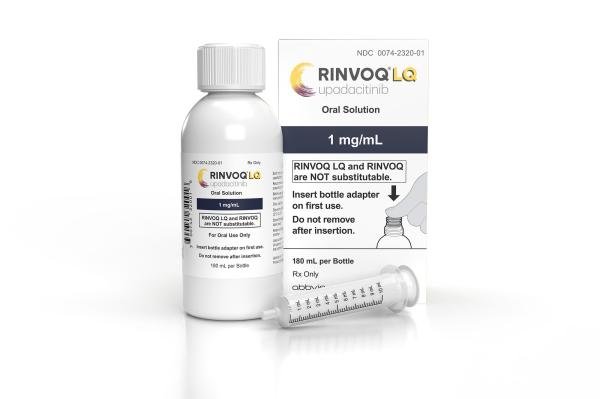Rinvoq LQ and Alcohol/Food Interactions
There are 2 alcohol/food/lifestyle interactions with Rinvoq LQ (upadacitinib).
Upadacitinib Food/Lifestyle
Major Food Interaction
GENERALLY AVOID: Grapefruit, grapefruit juice or supplements containing grapefruit may increase the plasma concentrations of upadacitinib. The proposed mechanism is inhibition of CYP450 3A4-mediated first-pass metabolism in the gut wall by certain compounds present in these fruits. Inhibition of hepatic CYP450 3A4 may also contribute. The interaction has not been studied with grapefruit. In study subjects, administration with the potent CYP450 3A4 inhibitor ketoconazole increased upadacitinib peak plasma concentration (Cmax) and systemic exposure (AUC) by 70% and 75%, respectively. In general, the effect of grapefruit juice is concentration-, dose- and preparation-dependent, and can vary widely among brands. Certain preparations of grapefruit juice (e.g., high dose, double strength) have sometimes demonstrated potent inhibition of CYP450 3A4, while other preparations (e.g., low dose, single strength) have typically demonstrated moderate inhibition. Upadacitinib side effects including lymphopenia, neutropenia, anemia, serious infections, and hyperlipidemia may be increased.
MONITOR CLOSELY: Smoking during treatment with upadacitinib may increase the risk of major adverse cardiovascular events (MACE) and the risk of developing malignancies. During upadacitinib clinical studies, current or past smokers had an additional increased risk of overall malignancies. Also, upadacitinib may increase patients' risk of MACE, including myocardial infarction, stroke, and cardiovascular death.
MANAGEMENT: The manufacturer advises that concomitant use of upadacitinib with grapefruit, grapefruit juice, or supplements containing grapefruit should be avoided. Caution is advised if upadacitinib is prescribed to current or past smokers. Patients should be informed about the symptoms of serious cardiovascular events and the steps to take if they occur. The manufacturer recommends discontinuing upadacitinib in patients who have experienced a myocardial infarction or stroke.
References (2)
- (2022) "Product Information. Rinvoq (upadacitinib)." AbbVie Pty Ltd, 7
- (2022) "Product Information. Rinvoq (upadacitinib)." AbbVie US LLC
Switch to consumer interaction data
Upadacitinib High Cholesterol (Hyperlipoproteinemia, Hypertriglyceridemia, Sitosterolemia)
Moderate Potential Hazard, Moderate plausibility
upadacitinib - hyperlipidemia
Treatment with upadacitinib is associated with increases in lipid parameters, including total cholesterol, low-density lipoprotein (LDL) cholesterol, and high-density lipoprotein (HDL) cholesterol. Care should be exercised when using this agent in patients with hyperlipidemia. It is recommended to monitor patients after initiation of treatment, and thereafter according to the clinical guidelines and to manage patients accordingly.
References (1)
- (2019) "Product Information. Rinvoq (upadacitinib)." AbbVie US LLC
Switch to consumer interaction data
Rinvoq LQ drug interactions
There are 620 drug interactions with Rinvoq LQ (upadacitinib).
Rinvoq LQ disease interactions
There are 9 disease interactions with Rinvoq LQ (upadacitinib) which include:
- cardiovascular risk
- malignancy
- thrombosis
- infections
- cytopenias
- gastrointestinal perforation
- hepatic impairment
- hyperlipidemia
- vaccination
More about Rinvoq LQ (upadacitinib)
- Check interactions
- Compare alternatives
- Pricing & coupons
- Drug images
- Latest FDA alerts (1)
- Side effects
- Dosage information
- During pregnancy
- Drug class: antirheumatics
- Breastfeeding
Related treatment guides
Drug Interaction Classification
| Highly clinically significant. Avoid combinations; the risk of the interaction outweighs the benefit. | |
| Moderately clinically significant. Usually avoid combinations; use it only under special circumstances. | |
| Minimally clinically significant. Minimize risk; assess risk and consider an alternative drug, take steps to circumvent the interaction risk and/or institute a monitoring plan. | |
| No interaction information available. |
See also:
Further information
Always consult your healthcare provider to ensure the information displayed on this page applies to your personal circumstances.


